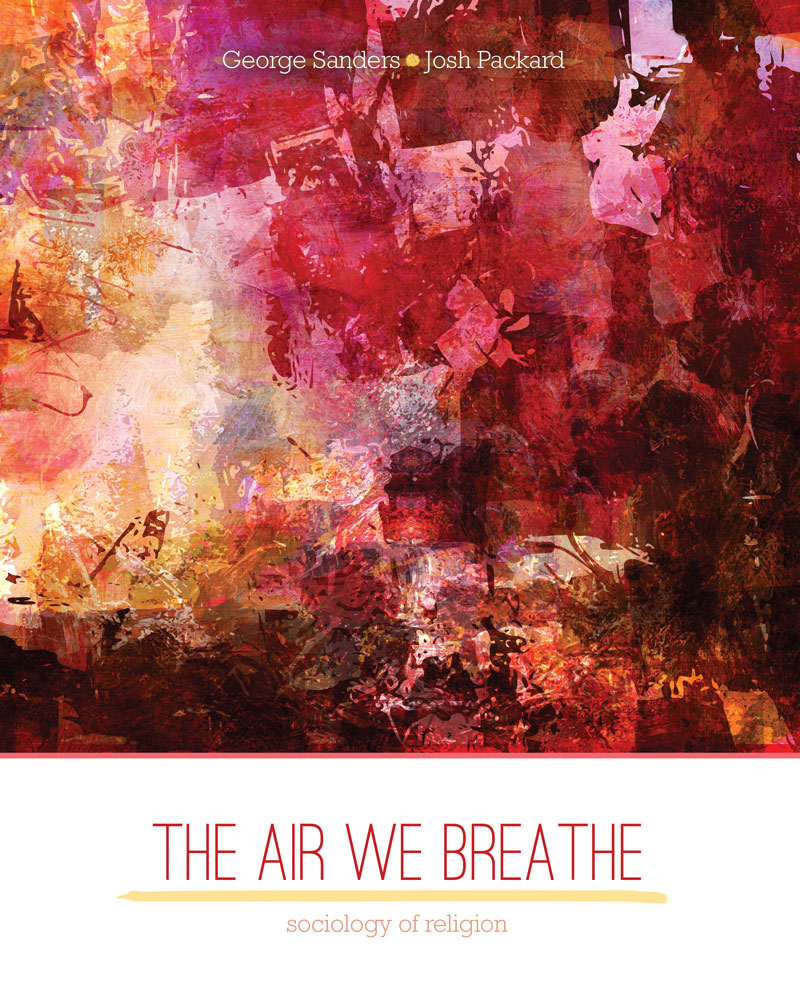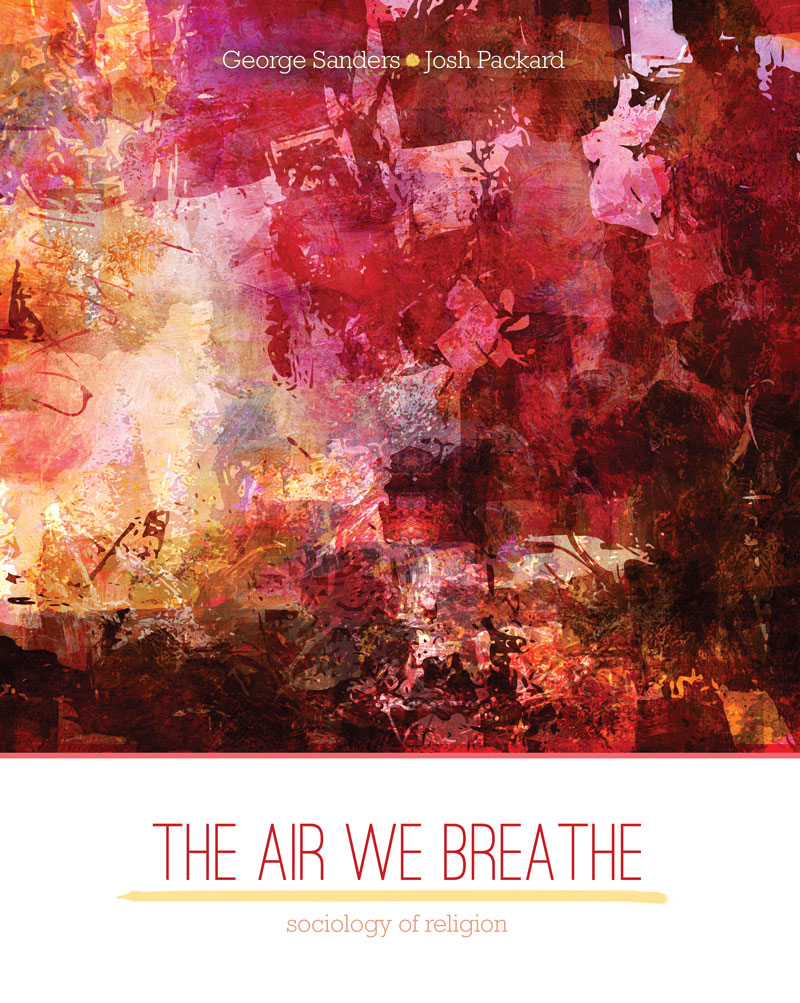The Air We Breathe: Sociology of Religion
Author(s): George Sanders , Josh Packard
Edition: 1
Copyright: 2016
Pages: 284 - no change for LSI printing
Edition: 1
Copyright: 2016
Pages: 284
Choose Your Format
Religion plays a vital role in geopolitics and in the course of student’s lives – even if they are not religious.
Yet, students often lack a framework for understanding how current arrangements and situations came to be or for understanding why religion operates as such an important force.
Featuring a unique approach, The Air We Breathe: A Sociology of Religion helps students learn sociology by studying religion. The book is situated around themes that apply across the field, not just to religion, and includes theories and ideas from outside of the subfield when appropriate (e.g., gender, organizational theory, group theory, etc.).
The Air We Breathe: A Sociology of Religion by George Sanders and Josh Packard:
- Gets readers to apply the sociological perspective by drawing on the available research and theories in the sociology of religion and the larger discipline of sociology to answer overriding questions about how religion shapes and is shaped by larger social forces.
- Incorporates more recent empirical and theoretical developments that have taken place outside of the sociology of religion.
- Is organized around central, interesting questions that students find accessible. These questions are answered with current research that has been applied in order to highlight the pragmatism of sociology of religion research.
- Features an international, pragmatic, comparative approach that illustrates the unique role of religion in the modern world and highlights how it shapes and is shaped by other social forces and institutions.
CHAPTER 1 Religious Universes and Spiritual Lives
Key Terms
Objectives
What is Sociology?
Types of Sociological Analysis
Levels of Analysis
What does Religion Do?
Abrahamic Religions
Islam
Buddhism and Hinduism
Denominations
Religious “Nones”
Discussion Questions
CHAPTER 2 Becoming Religious: Navigating Beliefs, Negotiating Expressions
Key Terms
Objectives
Religiosity
Social Construction
Is Religion in Decline?
Religious Socialization
The Religious Economy
Church and Sects
Discussion Questions
CHAPTER 3 Religion and Economics and the Worlds between Them
Key Terms
Objectives
Social Stratification
Rationalization
Weber’s Thesis
Consumerism and “Liquid Religion”
Liquid Religion and Commitment
Discussion Questions
CHAPTER 4 Religion and Equality for All: African American Activism
Key Terms
Objectives
Introduction
Agency and Structure
Racial Equality
After Slavery
Institutionalized Racism
The 1950s and Beyond
Black Power
The Social Gospel
Discussion Questions
CHAPTER 5 The Religious Right
Key Terms
Objectives
Introduction
Christian Evangelicalism and Christian Fundamentalism: Some Basics
Historical Background on Fundamentalism
Millenarianism
Fundamentalism in the 20th Century
Fundamentalism as it is Lived Today
The Rise of Televangelism
TV Becomes Political
Neoliberalism
Discussion Questions
CHAPTER 6 Sexed and Sexual Souls
Key terms
Objectives
Women in the World
Religion and Women
Gender and Sex
Religion and Gender
Separate Spheres
Women at the Forefront
Masculinity
Sexual Expression
What Is Normal?
LGBTQ
Complexity
Discussion Questions
CHAPTER 7 The End of Religion As We Know It, or Just a New Beginning?
Key Terms
Objectives
Introduction
Society Divinized
Civil Religion
Privatization of Religion
Therapeutic Religions
What Are We Celebrating Now?
Discussion Questions
CHAPTER 8 From Chapels to Arenas
Key Terms
Objectives
Introduction
The Theory of McDonaldization
Megachurches
Seekers
The “Business” of the Megachurch
Another Perspective
The Key Difference
Discussion Questions
CHAPTER 9 Past Religion but Post-Secular
Key Terms
Objectives
The Radical Lack
Postmodern Religion
Postmodernity
Heaven’s Gate
Edge Religions
Conclusion
Discussion Questions
CHAPTER 10 Trends in Religious Affiliation
Key Terms
Objectives
Introduction
Where Are We Now?
How Did We Get Here?
So, Where Are We Going?
Stepping Boldly Into the Future
Discussion Questions
Glossary
Bibliography
Index
George Sanders, Ph.D.
Vanderbilt University, 2008
Like many undergraduate students, I did not enter college with a clear goal. So I found myself exploring many different classes across the university curriculum. The problem wasn’t that I was dissatisfied with a particular topic, discipline, or major. It was the opposite. Just about everything I studied held some attraction or fascination for me. The more I ventured across different academic terrains, the more I became curious about what else there was to know. The first couple of years I probably declared a new major every single semester.
College, in some ways, is a real-life adventure. There we can take responsible risks and allow ourselves to be challenged, setting aside what we think we know and what we take for granted as being “real” or “true.” This is what I like most about the sociology and specifically the sociology of religion. For those whose religion occupies a central place in their lives - who are guided by their religious principles and practices - their truth is incontrovertible and their reality is well structured. And yet we recognize that in an increasingly diverse society, people’s truths and realities vary significantly. To me the sociology of religion makes space for that fact. Sociology provides the empirics, the tools, and the scientific bona fides for making sense out of multiple realities and multiple truths. In doing so, sociology delicately balances the relative with the absolute.
These presuppositions guide all of my research, which to this point has examined the role of the sacred in a consumer-driven, postmodern context. For me personally, the highlight of my scholarly explorations has been the manner in which we as a society have proven quite capable of realizing transcendence and a sense of enchantment in spite of an environment saturated by rationalizing mechanisms.
Oakland University has been a welcome and welcoming setting for my work. Situated outside the city of Detroit, the region is, in spite of reasonable expectations, undergoing a kind of miraculous resurrection. It is nothing short of inspiring, something keenly reflected in my students; they are committed to realizing transformation and they refuse to abandon their wide-eyed wonder. Indeed, I’d have to say that those students are pretty darn awesome.
Josh Packard, Ph.D.
Vanderbilt University, 2008
When I was an undergraduate, I had the opportunity to visit a synagogue, a church and a mosque in the same semester for one of my courses. I remember being struck by their remarkable similarity. I found myself coming back, time and again, to the ways that people managed to organize their religious expressions in remarkably consistent ways even if those expressions were directed at unique expressions of God. This, to me, suggested something about the universality of religion. I did not know it at the time, but I was taking my first steps toward a sociological understanding of religion.
I remember, distinctly, my early conversations with friends, parents and pastors about the connections I saw between the role of ritual, the construction of belief and the common distinctions that religious systems made between the sacred and the everyday. I struggled to explain what I was thinking and they, as often as not, struggled to understand. Indeed, it is difficult to explain the sociological perspective of religion to others. It is, perhaps, too intimate for most religious people to be able to think abstractly about and too unfamiliar for the non-religious to fully grasp.
When George and I sat down to think about how we could remedy this gap for our own students, we hit on the idea of a textbook that would deal with real questions and issues in the study of religion. For me, this textbook is a natural fit with the kind of research and scholarship I already do. I began my formal research into religion with my dissertation, which was later turned into a book, The Emerging Church: Religion at the Margins. More recently, I wrote, with a student of mine, Church Refugees: Sociologists Reveal Why People are DONE with Church but not their Faith. Both of these books, and the articles and presentations that make up the rest of my research take a pragmatic approach. I had a question that I wanted to answer.
It helps that I work at The University of Northern Colorado where the sociology department has an explicitly applied focus. We take the approach that a sociological understanding of the world helps our students to do their jobs better and create a more critical, well-informed citizenry. I believe those values represented in my own scholarship and department are present in this textbook as well. As I wrote, outlined chapters and tracked down references, I often found myself returning to those early conversations I had as an undergraduate. I wanted this textbook to be a helpful way to frame conversations about religion from a sociological perspective. With all of that in mind, I hope you find this book to be, above all else, useful. I know that writing it has been immensely valuable for me and the conversations I continue to have with my students, colleagues, friends and family.
Religion plays a vital role in geopolitics and in the course of student’s lives – even if they are not religious.
Yet, students often lack a framework for understanding how current arrangements and situations came to be or for understanding why religion operates as such an important force.
Featuring a unique approach, The Air We Breathe: A Sociology of Religion helps students learn sociology by studying religion. The book is situated around themes that apply across the field, not just to religion, and includes theories and ideas from outside of the subfield when appropriate (e.g., gender, organizational theory, group theory, etc.).
The Air We Breathe: A Sociology of Religion by George Sanders and Josh Packard:
- Gets readers to apply the sociological perspective by drawing on the available research and theories in the sociology of religion and the larger discipline of sociology to answer overriding questions about how religion shapes and is shaped by larger social forces.
- Incorporates more recent empirical and theoretical developments that have taken place outside of the sociology of religion.
- Is organized around central, interesting questions that students find accessible. These questions are answered with current research that has been applied in order to highlight the pragmatism of sociology of religion research.
- Features an international, pragmatic, comparative approach that illustrates the unique role of religion in the modern world and highlights how it shapes and is shaped by other social forces and institutions.
CHAPTER 1 Religious Universes and Spiritual Lives
Key Terms
Objectives
What is Sociology?
Types of Sociological Analysis
Levels of Analysis
What does Religion Do?
Abrahamic Religions
Islam
Buddhism and Hinduism
Denominations
Religious “Nones”
Discussion Questions
CHAPTER 2 Becoming Religious: Navigating Beliefs, Negotiating Expressions
Key Terms
Objectives
Religiosity
Social Construction
Is Religion in Decline?
Religious Socialization
The Religious Economy
Church and Sects
Discussion Questions
CHAPTER 3 Religion and Economics and the Worlds between Them
Key Terms
Objectives
Social Stratification
Rationalization
Weber’s Thesis
Consumerism and “Liquid Religion”
Liquid Religion and Commitment
Discussion Questions
CHAPTER 4 Religion and Equality for All: African American Activism
Key Terms
Objectives
Introduction
Agency and Structure
Racial Equality
After Slavery
Institutionalized Racism
The 1950s and Beyond
Black Power
The Social Gospel
Discussion Questions
CHAPTER 5 The Religious Right
Key Terms
Objectives
Introduction
Christian Evangelicalism and Christian Fundamentalism: Some Basics
Historical Background on Fundamentalism
Millenarianism
Fundamentalism in the 20th Century
Fundamentalism as it is Lived Today
The Rise of Televangelism
TV Becomes Political
Neoliberalism
Discussion Questions
CHAPTER 6 Sexed and Sexual Souls
Key terms
Objectives
Women in the World
Religion and Women
Gender and Sex
Religion and Gender
Separate Spheres
Women at the Forefront
Masculinity
Sexual Expression
What Is Normal?
LGBTQ
Complexity
Discussion Questions
CHAPTER 7 The End of Religion As We Know It, or Just a New Beginning?
Key Terms
Objectives
Introduction
Society Divinized
Civil Religion
Privatization of Religion
Therapeutic Religions
What Are We Celebrating Now?
Discussion Questions
CHAPTER 8 From Chapels to Arenas
Key Terms
Objectives
Introduction
The Theory of McDonaldization
Megachurches
Seekers
The “Business” of the Megachurch
Another Perspective
The Key Difference
Discussion Questions
CHAPTER 9 Past Religion but Post-Secular
Key Terms
Objectives
The Radical Lack
Postmodern Religion
Postmodernity
Heaven’s Gate
Edge Religions
Conclusion
Discussion Questions
CHAPTER 10 Trends in Religious Affiliation
Key Terms
Objectives
Introduction
Where Are We Now?
How Did We Get Here?
So, Where Are We Going?
Stepping Boldly Into the Future
Discussion Questions
Glossary
Bibliography
Index
George Sanders, Ph.D.
Vanderbilt University, 2008
Like many undergraduate students, I did not enter college with a clear goal. So I found myself exploring many different classes across the university curriculum. The problem wasn’t that I was dissatisfied with a particular topic, discipline, or major. It was the opposite. Just about everything I studied held some attraction or fascination for me. The more I ventured across different academic terrains, the more I became curious about what else there was to know. The first couple of years I probably declared a new major every single semester.
College, in some ways, is a real-life adventure. There we can take responsible risks and allow ourselves to be challenged, setting aside what we think we know and what we take for granted as being “real” or “true.” This is what I like most about the sociology and specifically the sociology of religion. For those whose religion occupies a central place in their lives - who are guided by their religious principles and practices - their truth is incontrovertible and their reality is well structured. And yet we recognize that in an increasingly diverse society, people’s truths and realities vary significantly. To me the sociology of religion makes space for that fact. Sociology provides the empirics, the tools, and the scientific bona fides for making sense out of multiple realities and multiple truths. In doing so, sociology delicately balances the relative with the absolute.
These presuppositions guide all of my research, which to this point has examined the role of the sacred in a consumer-driven, postmodern context. For me personally, the highlight of my scholarly explorations has been the manner in which we as a society have proven quite capable of realizing transcendence and a sense of enchantment in spite of an environment saturated by rationalizing mechanisms.
Oakland University has been a welcome and welcoming setting for my work. Situated outside the city of Detroit, the region is, in spite of reasonable expectations, undergoing a kind of miraculous resurrection. It is nothing short of inspiring, something keenly reflected in my students; they are committed to realizing transformation and they refuse to abandon their wide-eyed wonder. Indeed, I’d have to say that those students are pretty darn awesome.
Josh Packard, Ph.D.
Vanderbilt University, 2008
When I was an undergraduate, I had the opportunity to visit a synagogue, a church and a mosque in the same semester for one of my courses. I remember being struck by their remarkable similarity. I found myself coming back, time and again, to the ways that people managed to organize their religious expressions in remarkably consistent ways even if those expressions were directed at unique expressions of God. This, to me, suggested something about the universality of religion. I did not know it at the time, but I was taking my first steps toward a sociological understanding of religion.
I remember, distinctly, my early conversations with friends, parents and pastors about the connections I saw between the role of ritual, the construction of belief and the common distinctions that religious systems made between the sacred and the everyday. I struggled to explain what I was thinking and they, as often as not, struggled to understand. Indeed, it is difficult to explain the sociological perspective of religion to others. It is, perhaps, too intimate for most religious people to be able to think abstractly about and too unfamiliar for the non-religious to fully grasp.
When George and I sat down to think about how we could remedy this gap for our own students, we hit on the idea of a textbook that would deal with real questions and issues in the study of religion. For me, this textbook is a natural fit with the kind of research and scholarship I already do. I began my formal research into religion with my dissertation, which was later turned into a book, The Emerging Church: Religion at the Margins. More recently, I wrote, with a student of mine, Church Refugees: Sociologists Reveal Why People are DONE with Church but not their Faith. Both of these books, and the articles and presentations that make up the rest of my research take a pragmatic approach. I had a question that I wanted to answer.
It helps that I work at The University of Northern Colorado where the sociology department has an explicitly applied focus. We take the approach that a sociological understanding of the world helps our students to do their jobs better and create a more critical, well-informed citizenry. I believe those values represented in my own scholarship and department are present in this textbook as well. As I wrote, outlined chapters and tracked down references, I often found myself returning to those early conversations I had as an undergraduate. I wanted this textbook to be a helpful way to frame conversations about religion from a sociological perspective. With all of that in mind, I hope you find this book to be, above all else, useful. I know that writing it has been immensely valuable for me and the conversations I continue to have with my students, colleagues, friends and family.



